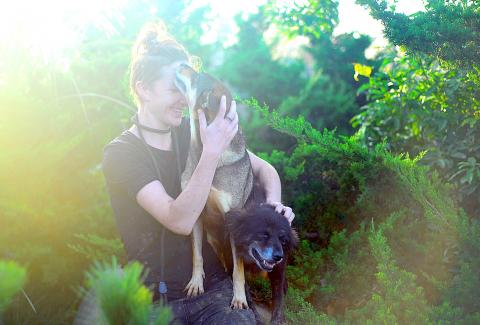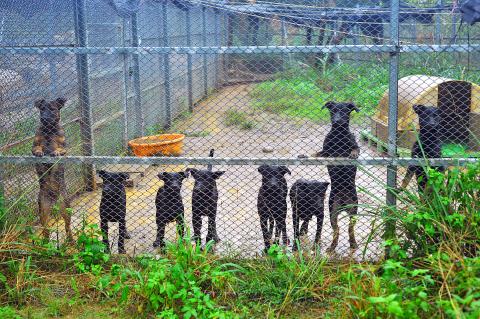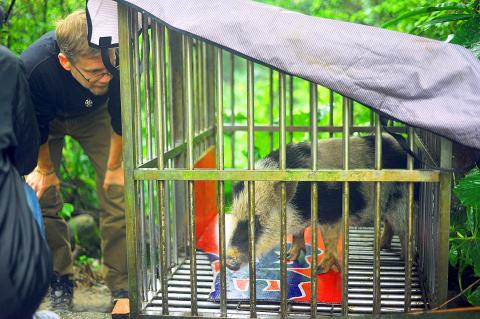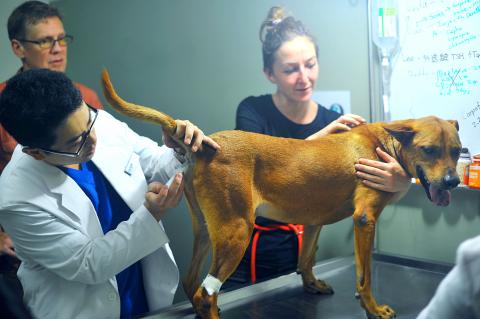Kevin Bacon was rescued two weeks ago from a roadside cage in New Taipei City.
He’s now resting and rehabilitating in a shipping container full of hay in the mountains near Taiwan’s north coast, eating proper meals and getting stronger by the day. Soon, he’ll be introduced to the other eight pigs who live at The PACK Sanctuary.
The operation to save Kevin’s bacon was the first ever joint venture between the Taiwan Society for the Prevention of Cruelty to Animals (TSPCA) and PACK, another step toward new director Tim Gorski’s goal to collaborate and build community with other animal welfare organizations in Taiwan.

Photo: Han Cheung, Taipei Times
“Until I stepped in to PACK, I felt there was kind of a competitive behavior among animal welfare groups in Taiwan,” Gorski says. “I realize we’re all competing for funds, but this is not a competition. These are our comrades in arms, fighting for the same animals we are.”

Gorski, an animal activist filmmaker who has worked with and built many shelters took over PACK after founder Sean McCormack’s departure in early August. With more than 400 animals, including about 370 dogs, the place is at full capacity and Gorski hopes to focus on fostering, adoptions and educating the public. He’s made other changes with the shelter such as having weekly visits from a veterinarian.
“We’re like a bucket under a leaky faucet that is pouring out neglected and abused animals,” Gorski says. “Sean built a very nice, great, happy bucket. But we have no more room to [expand]. The biggest problems lie within the pet industry. That’s the problem we need to address, and teach people what’s bad about puppy mills.”
ADOPT, DON’T SHOP
PACK staff were relieved last week as the government finally handed them their fundraising license. For the past four months, the shelter could only accept passive donations, making it difficult to cover its monthly operating costs of NT$1 million.

But despite trying to adopt out the animals, Gorski says the total number is increasing due to people leaving their dogs at the entrance. Tang Ming-hsiu (唐明秀), who is in charge of adoptions at PACK, says the adoption rate is slow at about three dogs per month.
She says people often have reservations about shelter animals because many of them are missing limbs or have emotional issues. Another problem is society’s preference for purebreds such as shibas, corgis and red poodles.

“The biggest issue, however, is the size of Taipei apartments,” she says. “People say they want to help, but they can only take a 5kg dog. That rules out 98 percent of our animals.”
Despite having so many animals, site manager Caroline Walshe and a handful of staff members personally feed the dogs every day. She knows most of the residents, which are mostly grouped by temperament in large fenced gardens with plenty of vegetation and shelter.
As an expat, Walshe initially didn’t want a dog, but she now has three from the shelter — Alice, who came emaciated, furless and covered in ticks; Scooby, who lost his tail and front paw in a trap; and Eva, who is old, blind and deaf.
She believes that in addition to education, the key to lifting adoption or fostering levels is to have people spend time with the dogs.
“You meet them and fall in love,” she says. “Nearly everyone here has a dog from this place.”
“If we can get 20 dogs fostered, that frees up two of these whole gardens,” Gorski says. “We can rotate dogs and build more of a house shelter so they’re also accustomed to living indoors. Otherwise they become semi-feral out here.”
Walshe welcomes the new changes. Before the veterinarians started visiting in early October, a lot of time was spent making vet runs to Taipei, which is one-hour each way.
“There’s nothing worse than someone leaving for the vet and five minutes later you have another dog,” she says. “We’re learning a lot too. They’re showing us how to clean wounds and identify parasites with a microscope.”
A trainer also visits the facility to teach staff and volunteers how to walk and train dogs. Gorski says that helps dogs and volunteers bond as well.
“Some volunteers might say, ‘I want to adopt this dog I’m really connecting with,’” Gorski says.
GOTTA CUT LOOSE
TSPCA director Connie Chiang (姜怡如) says they were not in contact with PACK before Gorski reached out a few months ago. Since TSPCA doesn’t have a shelter, they decided to start with joint rescues, with TSPCA sponsoring the animal and PACK housing it. This resulted in the case of Kevin Bacon, who was kept in a cage his whole life for the sole purpose of eating kitchen scraps since the garbage truck didn’t come by that address.
“Prior to this, we went online to look for fosters,” she says. “And it’s hard to find a pig sanctuary. We called some pig farms and they were all full.”
Chiang adds that they hope to do some joint educational campaigns as well.
Gorski and Claire Chen (陳其兒), who is in charge of education, outreach and events, have been making presentations about adopting and puppy mills at various schools and organizations. They hope that the students can visit PACK as volunteers and also help them spread the message to other students.
But reaching out to other organizations isn’t always as easy as it seems. Chen says she was turned down by a rescue animal halfway house, who told them they were already working with another group and “didn’t need this kind of collaboration.”
“I was kind of shocked,” she says. “You’re telling me that you don’t need support or even want to know what we’re trying to do?”
Last month’s endeavor to two Taichung shelters was more successful, to which PACK donated its excess towels.
“We share the same goals, but everyone is working on their own and that’s not enough,” Chen says. “We can share resources. We can share information. We need that right now in Taiwan.”

In the March 9 edition of the Taipei Times a piece by Ninon Godefroy ran with the headine “The quiet, gentle rhythm of Taiwan.” It started with the line “Taiwan is a small, humble place. There is no Eiffel Tower, no pyramids — no singular attraction that draws the world’s attention.” I laughed out loud at that. This was out of no disrespect for the author or the piece, which made some interesting analogies and good points about how both Din Tai Fung’s and Taiwan Semiconductor Manufacturing Co’s (TSMC, 台積電) meticulous attention to detail and quality are not quite up to

April 21 to April 27 Hsieh Er’s (謝娥) political fortunes were rising fast after she got out of jail and joined the Chinese Nationalist Party (KMT) in December 1945. Not only did she hold key positions in various committees, she was elected the only woman on the Taipei City Council and headed to Nanjing in 1946 as the sole Taiwanese female representative to the National Constituent Assembly. With the support of first lady Soong May-ling (宋美齡), she started the Taipei Women’s Association and Taiwan Provincial Women’s Association, where she

It is one of the more remarkable facts of Taiwan history that it was never occupied or claimed by any of the numerous kingdoms of southern China — Han or otherwise — that lay just across the water from it. None of their brilliant ministers ever discovered that Taiwan was a “core interest” of the state whose annexation was “inevitable.” As Paul Kua notes in an excellent monograph laying out how the Portuguese gave Taiwan the name “Formosa,” the first Europeans to express an interest in occupying Taiwan were the Spanish. Tonio Andrade in his seminal work, How Taiwan Became Chinese,

Mongolian influencer Anudari Daarya looks effortlessly glamorous and carefree in her social media posts — but the classically trained pianist’s road to acceptance as a transgender artist has been anything but easy. She is one of a growing number of Mongolian LGBTQ youth challenging stereotypes and fighting for acceptance through media representation in the socially conservative country. LGBTQ Mongolians often hide their identities from their employers and colleagues for fear of discrimination, with a survey by the non-profit LGBT Centre Mongolia showing that only 20 percent of people felt comfortable coming out at work. Daarya, 25, said she has faced discrimination since she